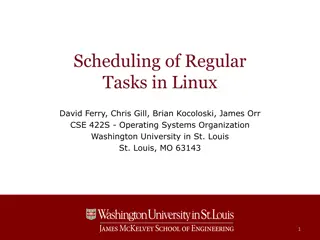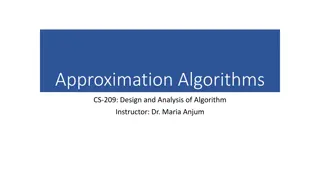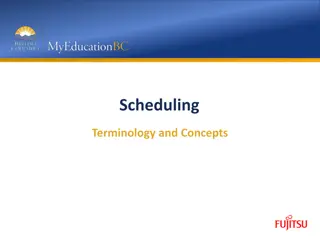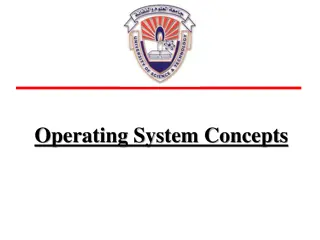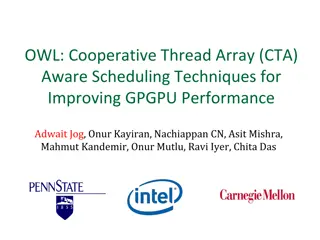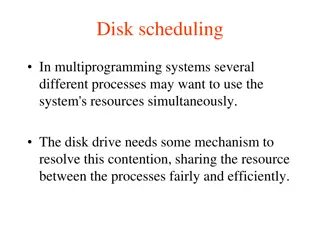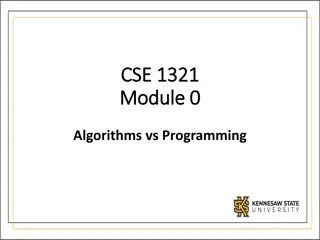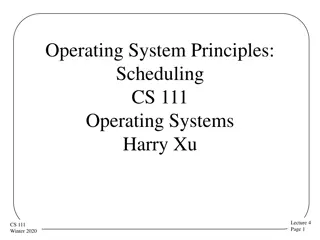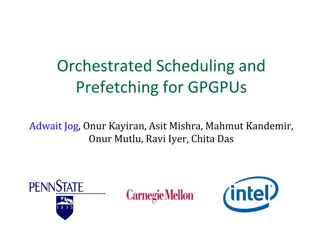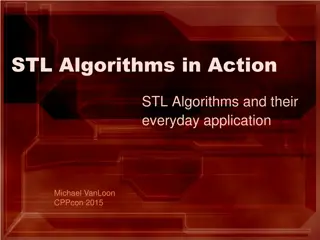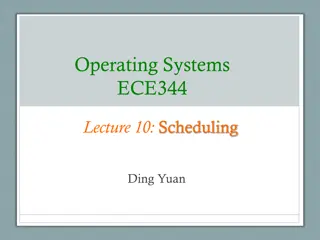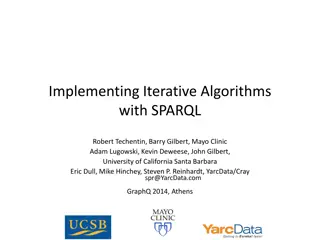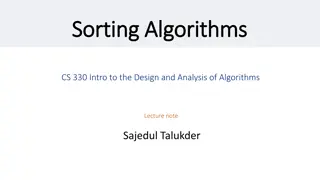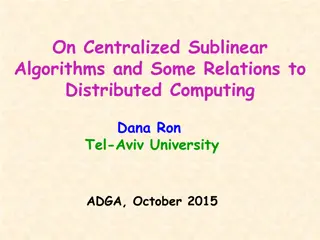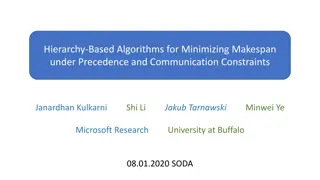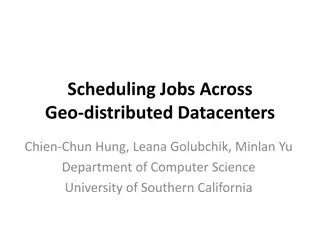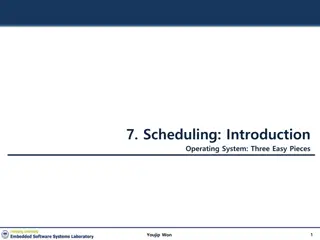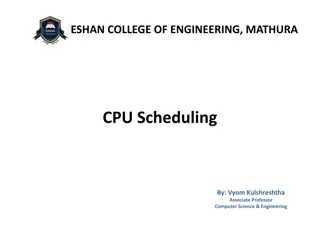Understanding Linux Process Scheduling and Priorities
Delve into the intricacies of process scheduling in Linux systems, covering topics such as task prioritization, process states, scheduler decisions, and important scheduling scenarios. Learn about traditional scheduling concerns like throughput and latency, as well as different types of workloads su
1 views • 19 slides
Understanding Algorithms and Programming Fundamentals
Learn about algorithms, programming, and abstraction in computing. Explore the definition and properties of algorithms, the relationship between algorithms and programming, and the concept of abstraction. Discover how algorithms are like recipes and how abstraction simplifies complex tasks in comput
1 views • 17 slides
Near-Optimal Quantum Algorithms for String Problems - Summary and Insights
Near-Optimal Quantum Algorithms for String Problems by Ce Jin and Shyan Akmal presents groundbreaking research on string problem solutions using quantum algorithms. The study delves into various key topics such as Combinatorial Pattern Matching, Basic String Problems, Quantum Black-box Model, and mo
0 views • 25 slides
Understanding Approximation Algorithms: Types, Terminology, and Performance Ratios
Approximation algorithms aim to find near-optimal solutions for optimization problems, with the performance ratio indicating how close the algorithm's solution is to the optimal solution. The terminology used in approximation algorithms includes P (optimization problem), C (approximation algorithm),
2 views • 10 slides
Understanding Scheduling Terminology and Concepts in MyEdBC
Explore the key terminology and concepts related to scheduling in MyEdBC, including the Build view, scenarios, flat and rotated schedules, patterns, and base terms. Get insights into setting up scheduling structures and preferences, as well as managing course requests and staff information. Enhance
1 views • 13 slides
GPU Scheduling Strategies: Maximizing Performance with Cache-Conscious Wavefront Scheduling
Explore GPU scheduling strategies including Loose Round Robin (LRR) for maximizing performance by efficiently managing warps, Cache-Conscious Wavefront Scheduling for improved cache utilization, and Greedy-then-oldest (GTO) scheduling to enhance cache locality. Learn how these techniques optimize GP
0 views • 21 slides
Combining Graph Algorithms with Data Structures and Algorithms in CSE 373 by Kasey Champion
In this lecture, Kasey Champion covers a wide range of topics including graph algorithms, data structures, coding projects, and important midterm topics for CSE 373. The lecture emphasizes understanding ADTs, data structures, asymptotic analysis, sorting algorithms, memory management, P vs. NP, heap
0 views • 38 slides
Time-Aware Scheduling Capabilities in IEEE 802.11be
Describing necessary enhancements to enable Time-Aware Scheduling in IEEE 802.11be for time-sensitive applications. The focus is on aligning with the 802.1Qbv standard to address latency, jitter, and reliability issues, presenting a structured outline of requirements and configurations essential for
0 views • 24 slides
Understanding Scheduling Algorithms in Operating Systems
Exploring the world of scheduling in operating systems, this content covers various aspects such as introduction to scheduling, process behavior, bursts of CPU usage, CPU-bound and I/O-bound processes, when to schedule processes, and the differences between non-preemptive and preemptive scheduling a
0 views • 34 slides
Understanding CPU Scheduling in Operating Systems
In a single-processor system, processes take turns running on the CPU. The goal of multiprogramming is to keep the CPU busy at all times. CPU scheduling relies on the alternating CPU and I/O burst cycles of processes. The CPU scheduler selects processes from the ready queue to execute when the CPU i
1 views • 26 slides
Understanding Randomized Algorithms: A Deep Dive into Las Vegas and Monte Carlo Algorithms
Randomized algorithms incorporate randomness into computations, with Las Vegas algorithms always providing the correct answer but varying in time, while Monte Carlo algorithms occasionally give wrong answers. Quick Sort is a classic Las Vegas algorithm that involves pivoting elements for sorting. Ch
4 views • 21 slides
Improving GPGPU Performance with Cooperative Thread Array Scheduling Techniques
Limited DRAM bandwidth poses a critical bottleneck in GPU performance, necessitating a comprehensive scheduling policy to reduce cache miss rates, enhance DRAM bandwidth, and improve latency hiding for GPUs. The CTA-aware scheduling techniques presented address these challenges by optimizing resourc
0 views • 33 slides
Simplifying Residency Shift Scheduling with Mathematical Programming Techniques
This project, led by Professor Amy Cohn and William Pozehl, aims to demonstrate how mathematical programming techniques can simplify the complex task of residency shift scheduling. The Residency Shift Scheduling Game highlights the challenges of manual scheduling and the ease of using mathematical p
1 views • 37 slides
Understanding Disk Scheduling in Multiprogramming Systems
In a multiprogramming system, several processes may contend for disk resources. Disk scheduling aims to efficiently share the disk drive's resources among processes, maximizing I/O request satisfaction while minimizing head movement. Various disk scheduling policies like FCFS, SSTF, and SCAN aim to
1 views • 22 slides
Understanding Algorithms and Programming: A Visual Introduction
Explore the fundamental concepts of algorithms and programming through visual representations and practical examples. Learn about algorithmic thinking, abstraction, recipe-like algorithms, and the importance of logical steps in accomplishing tasks. Discover how algorithms encapsulate data and instru
1 views • 17 slides
Distributed Algorithms for Leader Election in Anonymous Systems
Distributed algorithms play a crucial role in leader election within anonymous systems where nodes lack unique identifiers. The content discusses the challenges and impossibility results of deterministic leader election in such systems. It explains synchronous and asynchronous distributed algorithms
2 views • 11 slides
Mathematical Analysis of Algorithms in CMPE371 - Fall 2023-2024
Explore the mathematical analysis of algorithms in CMPE371 for Fall 2023-2024, focusing on non-recursive and recursive algorithms. Learn how to analyze non-recursive algorithms by deciding on input size parameters, identifying basic operations, and simplifying summations. Dive into recursive algorit
1 views • 31 slides
Understanding Operating System Scheduling Principles
Operating system scheduling involves making decisions on resource allocation among multiple clients, determining who gets to use the resource next and for how long. Different scheduling algorithms aim to achieve specific goals, such as maximizing throughput, minimizing waiting time, ensuring fairnes
0 views • 57 slides
Pseudodeterministic Algorithms and Their Application in Search Problems
Pseudodeterministic algorithms provide a unique approach to the search problem associated with binary relations, offering an error reduction technique while sacrificing the ability to approximate the average value of a function. By introducing m-pseudodeterministic and pseudo-pseudodeterministic alg
1 views • 6 slides
Orchestrated Scheduling and Prefetching for GPGPUs
This paper discusses the implementation of an orchestrated scheduling and prefetching mechanism for GPGPUs to enhance system performance by improving IPC and overall warp scheduling policies. It presents a prefetch-aware warp scheduler proposal aiming to make a simple prefetcher more capable, result
0 views • 46 slides
Efficient Department Scheduling for Timetabling Success
Efficient timetabling for a department involves various stages like data entry, draft timetable creation, feedback collection, production of the final timetable, schedule adjustments, and publication. Key information needed includes faculty availability, room inventory, specific scheduling parameter
0 views • 59 slides
Understanding STL Algorithms: A Practical Guide
Explore the world of STL algorithms through an insightful discussion on the definition of algorithms, the advantages of using STL algorithms over raw loops, and the different classes of STL algorithms available. Discover how these pre-built libraries can enhance your programming efficiency and code
1 views • 99 slides
Exploring the Role of Algorithms in Game Design
Delve into the world of algorithms in game design, from understanding the fundamental concept of algorithms to their pervasive presence in various aspects of gaming, such as military simulations, medical simulations, and gameplay mechanics. Explore how algorithms shape experiences in different types
0 views • 10 slides
Evolutionary Computation and Genetic Algorithms Overview
Explore the world of evolutionary computation and genetic algorithms through a presentation outlining the concepts of genetic algorithms, parallel genetic algorithms, genetic programming, evolution strategies, classifier systems, and evolution programming. Delve into scenarios in the forest where gi
0 views • 51 slides
Understanding Scheduling in Operating Systems: A Comprehensive Overview
This content delves into the intricate details of scheduling in operating systems, covering the goals, various scheduling algorithms, multiprogramming concepts, decision-making processes for resource allocation, timing considerations, scheduling objectives, and performance criteria such as throughpu
0 views • 42 slides
Online Advertising and Algorithms: Insights and Simplifications
Explore the world of online advertisements and algorithms through insightful discussions on online advertising, modern developments in online algorithms, and practical optimization strategies like budgeted allocation. Delve into topics such as decision-making under uncertainty, accessing algorithms,
1 views • 22 slides
Implementing Iterative Algorithms with SPARQL
This comprehensive guide explores the implementation of iterative algorithms with SPARQL, focusing on YarcData/Cray's approach to using these algorithms. It covers YarcData's interest in graphs, the Urika appliance, iterative algorithms in machine learning, implementation approach, and algorithms im
1 views • 12 slides
Understanding Greedy Algorithms in Interval Scheduling
Interval Scheduling is a classic algorithmic problem where the goal is to schedule a set of tasks to maximize efficiency without overlap. Greedy algorithms play a crucial role in solving this problem by making locally optimal choices at each step. The concept of greediness, building the solution ste
0 views • 24 slides
Overview of Sorting Algorithms and Quadratic Sorting - CS 330 Lecture Notes
Sorting algorithms play a crucial role in computer science and computing tasks, consuming a significant portion of computing power. Various algorithms such as Bubble Sort, Selection Sort, and Insertion Sort are discussed for sorting a list of values efficiently. Quadratic sorting algorithms like Sel
0 views • 30 slides
Understanding Sublinear Algorithms and Graph Parameters in Centralized and Distributed Computing
Centralized sublinear algorithms and their relation to distributed computing are explored, emphasizing the efficiency of algorithms in processing large inputs in sublinear time. Examples of sublinear algorithms for various objects are provided, along with the computation and approximation of graph p
1 views • 34 slides
College of Medicine M4 Scheduling Information for Class of 2021
Important scheduling timeline information for 4th-year medical students at the College of Medicine. Key dates include deadlines for hardship requests, core clerkship preferences, Geriatrics/Palliative Medicine enrollment, scheduling rounds, and publication rules. Compliance with specific requirement
0 views • 8 slides
CS260 Parallel Algorithms: Theory and Practice Review
This review covers essential topics from the CS260 Parallel Algorithms course by Yihan Sun, focusing on key concepts such as scheduler programs, cost models, reduce and scan techniques, PRAM models, atomic primitives, small algorithms, the master theorem, and sorting algorithms like Quicksort and Me
0 views • 25 slides
Hierarchy-Based Algorithms for Minimizing Makespan under Precedence and Communication Constraints
This research discusses hierarchy-based algorithms for minimizing makespan in scheduling problems with precedence and communication constraints. Various approximation techniques, open questions in scheduling theory, and QPTAS for different settings are explored, including the possibility of beating
0 views • 25 slides
Improving Job Scheduling with Nudge Policy
Explore the innovative Nudge policy for stochastic improvement upon First-Come-First-Served (FCFS) scheduling. The Nudge policy introduces a new approach with better performance tradeoffs compared to traditional scheduling methods. Discover how Nudge outperforms FCFS across various job size distribu
0 views • 21 slides
Job Scheduling Across Geo-distributed Datacenters
Scheduling jobs across geo-distributed datacenters poses challenges such as optimizing job completion time, reducing data transfer costs, and coordinating tasks across multiple locations. Various strategies like reordering-based approaches and scheduling heuristics are explored to enhance job schedu
0 views • 32 slides
Insights into Volunteer Scheduling and Management
Exploring the intricacies of volunteer scheduling, this informative guide covers topics such as creating schedule slots, weighing the pros and cons of scheduling, opportunity scheduling, monthly calendars, slot summaries, volunteer and opportunity listings, and more. Dive into the world of volunteer
0 views • 21 slides
University Space Scheduling Guidelines
University space scheduling guidelines prioritize academic courses and campus use, emphasizing the need for more available space. The policy outlines expectations, scheduling guidelines, and the management of laboratory and studio spaces. It also addresses the direct scheduling of such spaces for sp
0 views • 14 slides
Scheduling Strategies in Operating Systems
Operating systems utilize various scheduling algorithms to manage the execution of tasks efficiently. This includes strategies like First In, First Out (FIFO), Shortest Job First (SJF), and Shortest Time-to-Completion First (STCF). Each algorithm has its advantages and limitations, impacting factors
0 views • 17 slides
Understanding CPU Scheduling Concepts at Eshan College of Engineering, Mathura
Dive into the world of CPU scheduling at Eshan College of Engineering in Mathura with Associate Professor Vyom Kulshreshtha. Explore topics such as CPU utilization, I/O burst cycles, CPU burst distribution, and more. Learn about the CPU scheduler, dispatcher module, scheduling criteria, and the impl
0 views • 18 slides
Overview of Project Scheduling in Engineering Management
The lecture covers planning and scheduling in engineering management, focusing on activity and event scheduling techniques, bar charts, critical path analysis, and addressing project scheduling principles. It discusses the objectives of the lecture, the difference between planning and scheduling, th
0 views • 29 slides
